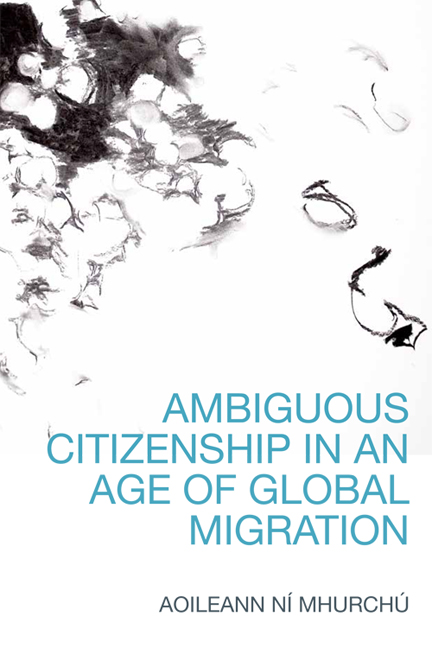Book contents
- Frontmatter
- Contents
- Acknowledgements
- Abbreviations
- Translations
- Introduction
- 1 Exploring the Citizenship Debate: The Sovereign Citizen-Subject
- 2 A Lens: The 2004 Irish Citizenship Referendum
- 3 Trapped in the Citizenship Debate: Sovereign Time and Space
- 4 Interrogating Sovereign Politics: An Alternative Citizen-Subject
- 5 Challenging the Citizenship Debate: Beyond State Sovereign Time and Space
- 6 Traces Rather than Spaces of Citizenship: Retheorising the Politics of Citizenship
- Conclusion
- Bibliography
- Index
5 - Challenging the Citizenship Debate: Beyond State Sovereign Time and Space
- Frontmatter
- Contents
- Acknowledgements
- Abbreviations
- Translations
- Introduction
- 1 Exploring the Citizenship Debate: The Sovereign Citizen-Subject
- 2 A Lens: The 2004 Irish Citizenship Referendum
- 3 Trapped in the Citizenship Debate: Sovereign Time and Space
- 4 Interrogating Sovereign Politics: An Alternative Citizen-Subject
- 5 Challenging the Citizenship Debate: Beyond State Sovereign Time and Space
- 6 Traces Rather than Spaces of Citizenship: Retheorising the Politics of Citizenship
- Conclusion
- Bibliography
- Index
Summary
But like part Irish or part American, yeah, like because I … my sport is football, like, Gaelic football, but I feel American, like, so it's kind of like the best of both or whatever you like, you know, so I don't know.
Colin, 18Between, yeah something in between because I am African so I can't just be Irish just because I live there for longer so I am African but I am also Irish in a way because I live here and I have grown up here more so then I have, I made more friends here than Africa so then the school I studied here so I am Irish schooled, this is where I am living …
Sarah, 15As these quotes demonstrate, when asked about their identities, many migrant youth find it very difficult to identify themselves within a sovereign spatio-temporal narrative involving coherent spaces of us/them, Irish/non-Irish, insider/outsider, there/here, now/then and movement in progressive time from one space to another space. Their attempts to locate themselves instead highlight the lack of coherency surrounding their processes of political identity and belonging. The point is not that national (or other territorialised) identity no longer matters, but that their experiences escape the coherency (calculability) normally associated with this. Political identity and belonging – for example, being Irish – is instead linked to a multitude of spaces such as school, sport and friendships as well as temporal inconsistencies – being both Irish and American or Irish and African, and neither (‘I don't know’) at the same time.
In an attempt to try to engage with these types of experience on their own less-than sovereign terms, this chapter considers exactly how Julia Kristeva's work can be used to move away from always defining the question of citizenship in terms of dualistic space and linear progressive time. Kristeva's work emphasises that reproduction can be shown to make impossible the automatic assumption of the coherent ‘I’ (‘woman’, ‘child’ or ‘migrant’) as the sovereign presence which can define claims to solidarity and can be contrasted with the citizen-subject. Her work indicates that the subject is tied to a contingent as opposed to an inevitably sovereign relationship between identity (people), place (territory) and history (narrative).
- Type
- Chapter
- Information
- Ambiguous Citizenship in an Age of Global Migration , pp. 163 - 189Publisher: Edinburgh University PressPrint publication year: 2014



